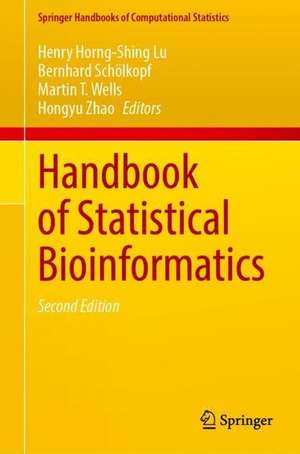Handbook of Statistical Bioinformatics: Springer Handbooks of Computational Statistics
Editat de Henry Horng-Shing Lu, Bernhard Schölkopf, Martin T. Wells, Hongyu Zhaoen Limba Engleză Hardback – 9 dec 2022
Preț: 1228.77 lei
Preț vechi: 1498.51 lei
-18% Nou
Puncte Express: 1843
Preț estimativ în valută:
235.15€ • 255.34$ • 197.53£
235.15€ • 255.34$ • 197.53£
Carte tipărită la comandă
Livrare economică 22 aprilie-06 mai
Preluare comenzi: 021 569.72.76
Specificații
ISBN-13: 9783662659014
ISBN-10: 3662659018
Pagini: 410
Ilustrații: VIII, 410 p. 80 illus., 67 illus. in color.
Dimensiuni: 155 x 235 mm
Greutate: 0.76 kg
Ediția:2nd ed. 2022
Editura: Springer Berlin, Heidelberg
Colecția Springer
Seria Springer Handbooks of Computational Statistics
Locul publicării:Berlin, Heidelberg, Germany
ISBN-10: 3662659018
Pagini: 410
Ilustrații: VIII, 410 p. 80 illus., 67 illus. in color.
Dimensiuni: 155 x 235 mm
Greutate: 0.76 kg
Ediția:2nd ed. 2022
Editura: Springer Berlin, Heidelberg
Colecția Springer
Seria Springer Handbooks of Computational Statistics
Locul publicării:Berlin, Heidelberg, Germany
Cuprins
Preface.- Part I Single-cell Analysis.- Computational and statistical methods for single-cell RNA sequencing data.- Pre-processing, dimension reduction, and clustering for single-cell RNA-seq data.- Integrative analyses of single-cell multi-omics data: a review from a statistical perspective.- Approaches to marker gene identification from single-cell RNA-sequencing data.- Model-based clustering of single-cell omics data.- Deep learning methods for single cell omics data.- Part II Network Analysis.- Probabilistic Graphical Models for Gene Regulatory Networks.- Additive conditional independence for large and complex biological structures.- Integration of Boolean and Bayesian Networks.- Computational methods for identifying microRNA-gene regulatory modules.- Causal inference in biostatistics.- Bayesian Balance Mediation Analysis in Microbiome Studies.- Part III Systems Biology.- Identifying genetic loci associated with complex trait variability.- Cell Type Specific Analysis for Gene Expression and DNA Methylation.- Recent development of computational methods in the field of epitranscriptomics.- Estimation of Tumor Immune Signatures from Transcriptomics Data.- Cross-Linking Mass Spectrometry Data Analysis.- Cis-regulatory Element Frequency Modules and their Phase Transition across Hominidae.- Improving tip-dating and rooting a viral phylogeny by modeling evolutionary rate as a function of time.
Notă biografică
Henry Horng-Shing Lu is a Professor at National Chiao Tung University (NCTU), which is merged with National Yang Ming Chiao Tung University (NYCU). He has served as the Vice President for Academic Affairs and Dean for College of Science in NCTU. He is an Elected Member of the International Statistical Institute and Principal Fellow of the High Education Academy. His research interests include statistics, data science, machine learning, image science, biomedical studies and industrial applications.
Bernhard Schölkopf is a member of the Max Planck Society and the Director of the Department of Empirical Inference at the Max Planck Institute for Intelligent Systems in Tübingen, Germany. He is also an Honorary Professor of Machine Learning at the Technical University Berlin. His scientific interests are in the field of machine learning and inference from empirical data, in particular, in machine learning methods for extracting statistical and causal regularities.
Martin T. Wells is the Charles A. Alexander Professor of Statistical Sciences at Cornell University in Ithaca, NY, USA. He is also a Professor of Biostatistics and Epidemiology at Weill Medical School, an Elected Member of the Cornell Law School Faculty, as well as the Director of Research in the School of Industrial and Labor Relations. His research fields and topics include biostatistics, Bayesian statistics, decision theory, epidemiology, high-dimensional data analysis, statistical bioinformatics, and empirical legal studies.
Hongyu Zhao is the Ira V. Hiscock Professor of Biostatistics and Professor of Statistics and Data Science and Genetics at Yale University, New Haven, CT, USA where he also serves as the Director of the Center for Statistical Genomics and Proteomics. His research interests include statistical genomics, computational biology, statistical proteomics, risk prediction, high dimensional data analysis, and network modeling and inference.
Bernhard Schölkopf is a member of the Max Planck Society and the Director of the Department of Empirical Inference at the Max Planck Institute for Intelligent Systems in Tübingen, Germany. He is also an Honorary Professor of Machine Learning at the Technical University Berlin. His scientific interests are in the field of machine learning and inference from empirical data, in particular, in machine learning methods for extracting statistical and causal regularities.
Martin T. Wells is the Charles A. Alexander Professor of Statistical Sciences at Cornell University in Ithaca, NY, USA. He is also a Professor of Biostatistics and Epidemiology at Weill Medical School, an Elected Member of the Cornell Law School Faculty, as well as the Director of Research in the School of Industrial and Labor Relations. His research fields and topics include biostatistics, Bayesian statistics, decision theory, epidemiology, high-dimensional data analysis, statistical bioinformatics, and empirical legal studies.
Hongyu Zhao is the Ira V. Hiscock Professor of Biostatistics and Professor of Statistics and Data Science and Genetics at Yale University, New Haven, CT, USA where he also serves as the Director of the Center for Statistical Genomics and Proteomics. His research interests include statistical genomics, computational biology, statistical proteomics, risk prediction, high dimensional data analysis, and network modeling and inference.
Textul de pe ultima copertă
Now in its second edition, this handbook collects authoritative contributions on modern methods and tools in statistical bioinformatics with a focus on the interface between computational statistics and cutting-edge developments in computational biology. The three parts of the book cover statistical methods for single-cell analysis, network analysis, and systems biology, with contributions by leading experts addressing key topics in probabilistic and statistical modeling and the analysis of massive data sets generated by modern biotechnology. This handbook will serve as a useful reference source for students, researchers and practitioners in statistics, computer science and biological and biomedical research, who are interested in the latest developments in computational statistics as applied to computational biology.
Caracteristici
Presents modern methods and tools at the interface between computational statistics and computational biology Covers key topics in statistical modeling and the analysis of massive data sets from modern biotechnology Addresses statistical methods for single-cell analysis, network analysis, and systems biology






